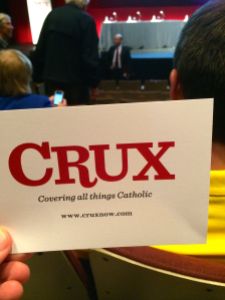
Bernard Law in the 1980s. Photo (cc) via City of Boston Archives.
In late 1990 and early 1991 I spent four and a half months as the production manager for The Pilot, the Archdiocese of Boston’s venerable weekly newspaper. It was a difficult time in my life, and I was happy to take the job. They didn’t ask if I was a Catholic; I didn’t tell them I wasn’t.
One of my responsibilities was to proofread and lay out Cardinal Bernard Law’s weekly column. There wasn’t much to that particular task. As I was reminded in reading Law’s obituary this morning, he had spent the early part of his career as the editor of a Catholic newspaper.
Of course, Law’s facility with a typewriter is not the first thing we think of when we look back upon his legacy. Law was an evil man — evil in the way of people who accept the realities of whatever bureaucratic environment they happen to find themselves in, carrying out their tasks without regard for morality or humanity. Law facilitated the serial rape of children, and if that made him not much different from others in his position, that doesn’t exonerate him, either.
In 2001 I had the privilege of sharing a pod at The Boston Phoenix with Kristen Lombardi, one of the country’s great investigative reporters. Kristen, who’s now with the Center for Public Integrity, wrote a series of detailed articles showing that Law was reassigning and covering up for the pedophile priests under his command. The following year, The Boston Globe began its remarkable Spotlight series, which resulted in Law’s resignation and a well-deserved Pulitzer for the Globe — not to mention the movie “Spotlight.” (Walter Robinson, who oversaw the Spotlight Team’s coverage of pedophile priests, spoke with WGBH Radio earlier today.)
After fleeing Boston 15 years ago, Law lived the good life in the Vatican. I don’t know if he understood the horror of what he had done, but surely he understood that he was a reviled figure. It’s too bad that, when he was still alive and healthy, Pope Francis didn’t fly him back to Boston under armed guard and order him to fend for himself in the city where he did so much harm. But not only did Francis not take such action, he’s honoring him with his presence at the funeral.
The phrase “banality of evil” is unavoidable in thinking about Law. I doubt he even realized he was doing anything wrong until it was too late. His life demonstrates the importance of exercising our individual conscience and of never putting the needs of an institution ahead of human lives. It would be easy to describe his fall as a tragedy, and I’m sure it was to him. The real tragedy, though, was in the suffering of his victims.

